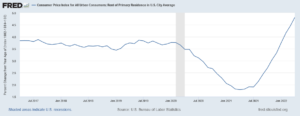June 09, 2022
Okay, that’s not exactly what the Post article said, but pretty much what is implied by the headline, “most Americans expect inflation to get worse, Post-Schar School poll finds.” As a practical matter, most Americans are probably not sitting up at night trying to project future inflation rates based on the available data.
Most Americans views of future inflation likely are based on what they hear from the media. With the media’s coverage of the economy focusing almost exclusively on inflation (most people think the economy has lost jobs since Biden took office, even though we actually have seen the fastest job growth ever), it is not surprising that most people would expect inflation to pick up.
If convincing people that inflation would get worse was the goal of economic reporting, then news outlets should take a bow. If their goal was informing the public, they might want to do some rethinking. FWIW, investors don’t share the view of most Americans. They expect inflation to slow sharply in the years ahead.
This article certainly helps build the case that inflation is devastating most people’s budget. The article profiles a nursing student in Logan, Utah who it says has seen their rent rise by 50 percent. That would be a crisis for most families. Thankfully, this person is very atypical. According to the Bureau of Labor Statistics, rent rose on average by 4.8 percent in the last year, after increasing just 1.8 percent in the prior 12 months.

This is not the only atypical example in the piece. The article also profiles a couple in Kentucky who take home $300 a week between them. We are told that one of them earns $9.25 an hour, which translates into take home pay of roughly $170 a week for a 20-hour workweek. If the other person also works a 20-hour workweek, then she must be getting close to $7.00 an hour.
This puts the pay of both workers will below the cutoff for the 10th percentile of wage earners, which was $11.71 an hour last year. It’s good that the Post is paying attention to people facing hardship in the economy, but it is wrong to present their experiences as typical.
The piece also suffers from the old “which way is up” problem. Early on it tells readers that people are putting off planned purchases because of inflation:
“Nearly 9 in 10 Americans say they’ve started bargain-hunting for cheaper products, and about three-quarters are cutting back on restaurants and entertainment, or putting off planned purchases, according to the Post-Schar poll conducted in late April and early May.”
But, a bit further down we get the complete opposite story:
“As more Americans change their behavior assuming inflation will get worse, those actions can drive inflation up, leading to a cycle that’s difficult to break. Indeed, some 52 percent of Americans in the poll said they bought products before the prices went up.”
So, people are both putting off planned purchases because of the bite of inflation and buying things earlier than they would have otherwise because of inflation. Yes, inflation is really bad news.







Comments